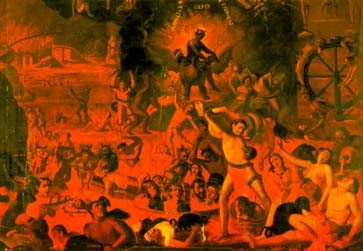1. Heaven — And Who Will Go There
by Pastor Cornelius R. Stam
Most people are surprised when they learn that the Old Testament, though three times as large as the New, does not contain one single promise about going to heaven. God’s people, in Old Testament times, looked forward to a glorified earth, with Messiah as its Ruler.
This was so even when our Lord was on earth and continued to be so through Pentecost. Peter, addressing his kinsmen just after Pentecost, said in essence: “Repent, and God will send Jesus down here” (See Acts 3:19-20), but Paul, in his epistles, says by divine inspiration: “Believe, and God will take you up there.”
This apostle of grace teaches us that God has already given believers in Christ a position and “all spiritual blessings” in heavenly places in Christ (Ephesians 2:4-6; 1:3). And he teaches further that at the close of this dispensation of grace “the dead in Christ shall rise” and “we which are alive and remain shall be caught up together …to meet the Lord… and so shall we ever be with the Lord” (I Thessalonians 4:16,17).
Thus it is that Paul, God’s special apostle for our day, declares that “our conversation [or citizenship] is in heaven” (Philippians 3:20) and writes of “the hope which is laid up for you in heaven” (Colossians 1:5). Thus it is that he encourages persecuted saints, saying: “Ye…took joyfully the spoiling of your goods, knowing…that ye have in heaven a better and an enduring substance” (Hebrews 10:34). And thus he writes even of death:
“For we know that if our earthly house of this tabernacle were dis- solved, we have a building of God, an house not made with hands, eternal in the heavens” (II Corinthians 5:1).
“…to die is gain….to depart and to be with Christ…is far better” (Philippians 1:21,23).
2. Painful Truths
By A.W. Tozer
The doctrine of eternal retribution has been held and taught by an overwhelming majority of Christians since the days of the apostles. Almost all, if not quite all, of the church fathers and of the great doctors and saints down the centuries believed that the Bible teaches that the finally impenitent will be cast into a hell from which there is no escape and with no further opportunity to repent and avail themselves of the mercy of God and the benefits of Christ’s atonement. They believed, as the vast majority of Bible-loving Christians today believe, that the personality of the impenitent man is perpetuated beyond the moment of physical death, and that the man must face a strict accounting of deeds done on earth and hear the sentence of doom pronounced against him.
I have read the arguments put forth against this belief and acknowledged the force of them, and though my human heart could welcome any gleam of hope, however faint, that might yet remain for the lost, the Scriptures are too plain to allow that hope to exist.
Frederic W. Farrar, the celebrated dean of Canterbury, pleaded with great moral earnestness and overpowering eloquence for what he called “eternal hope” for all men, and like a defense attorney managed to find among the works of the Latin fathers quotations to support that hope. But the weight of evidence on the side of the traditional belief is too great; there can be only one conclusion: the Bible teaches the doctrine of eternal retribution, and every calm, reasonable man will accept the doctrine; or if he rejects it he will reject the Bible along with it. The man who will not believe in hell must surrender his right to believe in heaven.
Verse
Then death and Hades were thrown into the lake of fire. The lake of fire is the second death. If anyone’s name was not found written in the book of life, he was thrown into the lake of fire. Revelation 20:14–15
Thought
There are great truths of God’s Word that are joyfully received. They give peace, hope, encouragement and much more. There are also truths that are painful to us. They declare to us the condition and doom of loved ones who have never experienced the second birth.
Prayer
Father, may painful truth in Your Word motivate me to share Your Good News with those who have yet to receive it.
Audio Sermons
The Voice of Conscience by A.W. Tozer
The Voice of Gods Judgement by A.W. Tozer
3. God’s Promise vs. Man’s Efforts
by Pastor Cornelius R. Stam
“For if they which are of the law be heirs, faith is made void, and the promise made of none effect: Because the law worketh wrath…” (Romans 4:14,15).
This should be self-evident to us all. If blessing is gained by the works of the Law, it is earned. This is why Galatians 3:18 says: “If the inheritance be of the law it is no more of promise, but God gave it to Abraham by promise.”
The Apostle Paul, God’s great apostle of grace, declares in Romans 4:4,5:
“Now to him that worketh is the reward not reckoned of grace, but of debt. But to him that worketh not, but believeth on Him that justifieth the ungodly, his faith is counted for righteousness.”
But let’s go back to that phrase: “the law worketh wrath.” Many people somehow do not see this. Even some clergymen tell us that the Law was given to help us to be good. But God Himself says, “the law worketh wrath.” Every criminal knows this, and every sinner should know it. God certainly places strong emphasis upon it:
“Wherefore then serveth the law? It was added because of transgressions” (Galatians 3:19), “that every mouth may be stopped, and all the world may be brought in guilty before God” (Romans 3:19). “Therefore by the deeds of the law there shall no flesh be justified in His sight, for by the law is the knowledge of sin” (Romans 3:20).
If we come to God expecting eternal life because of our good works, are we not offering Him our terms, which He can never accept? He will never sell salvation at any price, and certainly not for a few paltry “good” works, when our lives are filled with failure and sin.
Our only hope? God has promised to give eternal life to those who trust in His Son (John 3:35,36; Acts 16:31; etc.).
“The gift of God is eternal life, through Jesus Christ our Lord” (Romans 6:23).












Leave a Reply, please --- thank you.